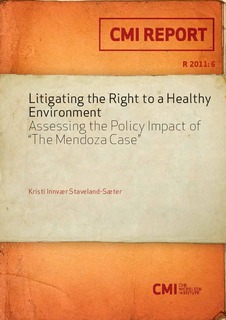Litigating the right to a healthy environment assessing the policy impact of "The Mendoza Case"
Research report
Permanent lenke
http://hdl.handle.net/11250/2474928Utgivelsesdato
2011-11-21Metadata
Vis full innførselSamlinger
- Publications [1488]
Originalversjon
Bergen: Chr. Michelsen Institute (CMI Report R 2011:6) 62 p.Sammendrag
This thesis enquires into the policy consequences of the Mendoza case, a public interest litigation case in Argentina, in which several non-governmental organizations (NGOs) and the National Ombudsman demanded action from authorities responsible for cleaning up the Matanza-Riachuelo river basin. The inter-jurisdictional pollution problem has existed for about 200 years, and it has been estimated to affect the health of more than 3.5 million people. However, the policymakers have mostly ignored the pollution problem. The response by the Supreme Court opened the political space for solving this problem. Since litigation is progressively being used as a strategy to hold governments accountable for implementing rights, it is important to assess the policy impact of litigation. This case study of the Mendoza case explores the dynamics in the policymaking process at all stages of the litigation process; from the time when a group of neighbours voiced their claims into the legal system, through the adjudication stage, and in the process of implementing the judgement. At all stages in the process the analysis identifies impact on social mobilization, policies and the policymaking process. The public hearings ordered by the Supreme Court initiated a process of dialogue between the parts in the Mendoza case. On 8 July 2008 the Supreme Court issued a landmark judgement that ordered the responsible authorities to implement a program of public policies to restore the environment, prevent future harm and improve the lives of the people living in the river basin area. Although the responsible authorities only to a limited extent have complied with the judgement, the analysis finds that the litigation has had a remarkable policy impact. It has also changed the policymaking process and it has had considerable indirect policy impact on social mobilization.
